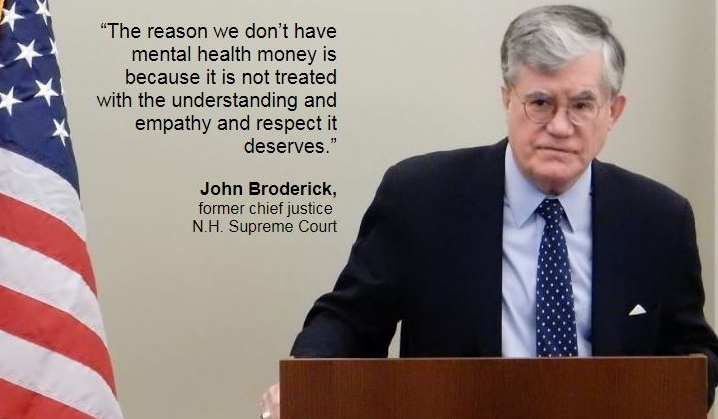The leading advocate for reforming how Granite Staters perceive and treat mental illness will be at SOS Recovery this Monday, and like Rodney Dangerfield used to say, all he's looking for is a little respect, not for him, but for the disease he's trying to take out of the shadows and plunk down at the kitchen table for the whole family to discuss.
It will be one of the rare times that John Broderick, a former New Hampshire Chief Justice and now the senior director of Public Affairs at Dartmouth Hitchcock Hospital, will take his story of personal trauma and redemption centered around mental illness to a peer-based drug recovery center.
But as he notes frankly, he's "trying to focus on mental illness exclusively, but that's not to say that it doesn't have some neighbors."
One of those "neighbors" is the scourge of opioids and other addictive drugs.
As the de facto mental illness czar for the state of New Hampshire, Broderick has crisscrossed the state for more than two years, speaking at some 300 events, mostly in school auditoriums and gyms.
In an exclusive interview with The Rochester Voice on Wednesday he said he's looking forward to speaking about mental illness on Monday, adding that co-occurring conditions like mental health and drug abuse are part of the fabric of mental illness.
"They are often connected," he said. "Most people with mental health do not have a substance abuse disorder, but a lot with substance abuse do have depression or other symptoms related to mental health issues."
Too often, he said, violence, criminal behavior, abusive parents and neglect also co-occur as part of a mosaic involving poor mental health, but there, too, the issues are treated separately from what is exacerbating the problem.
"We need to talk about mental illness like in a way we never have; we need to identify these co-occurring problems," Broderick said.
Broderick, who will share his family's journey in navigating mental illness, is the chief advocate for Dartmouth Hitchcock's R.E.A.C.T. mental health awareness campaign, which provides individuals with tips on how to recognize signs of emotional suffering and how to seek support for themselves and others.
Broderick noted that schools have been very helpful in allowing him to share with students the need to destigmatize mental illness.
But he said the parents are not as open and comfortable about discussing the issue as their children.
He told The Rochester Voice about one particular experience he had at a state high school that spoke volumes.
"This big guy, a varsity athlete, comes up and says, 'I may have some mental health issues,' and I said, "How bout talking to your parents?"
"He said, 'I could never talk to my parents about it,'" Broderick added.
"These kids want to change it, I want to accelerate the change," Broderick continued. "Parents think they should be afraid, or afraid they will be perceived to be at fault."
He said recently he talked to a high school assembly that numbered in the thousands, and after the assembly about 140 kids came up to talk to him. He spent about two hours discussing their concerns and fears.
That night a meeting at the same school was scheduled for parents. Only about 40 showed up.
Now, like Rodney Dangerfield, he's looking for some respect for mental illness. He thinks if he can turn the corner on this, maybe more money will be authorized to spend on mental health like is being achieved in the opioid crisis.
"The reason we don't have mental health money is because it is not treated with the understanding and empathy and respect it deserves," he said. "When I see kids who can't talk to parents, that means to me they must realize mental illness isn't popular.
"The shame must end."
Broderick's experience with his son's mental illness culminated in his March 2002 assault on his father in which he pummeled the sleeping judge with a guitar, a savage beating Broderick doesn't remember but put him in intensive care with a broken jaw and other serious injuries for weeks.
His son, Christian, then 30 and a longtime abuser of alcohol, spent three years in state prison before being paroled. John Broderick spent months recovering from his injuries.
Both Brodericks paid a price for not recognizing Christian's symptoms and seeking treatment.
On Wednesday Broderick reflected that "the cost of not treating mental illness is much higher than the cost of success."
SOS Recovery together with First Church Congregational will host the program, which begins at 7 p.m. at First Church Congregational, 63 S. Main St. It will be held in the Church sanctuary.













